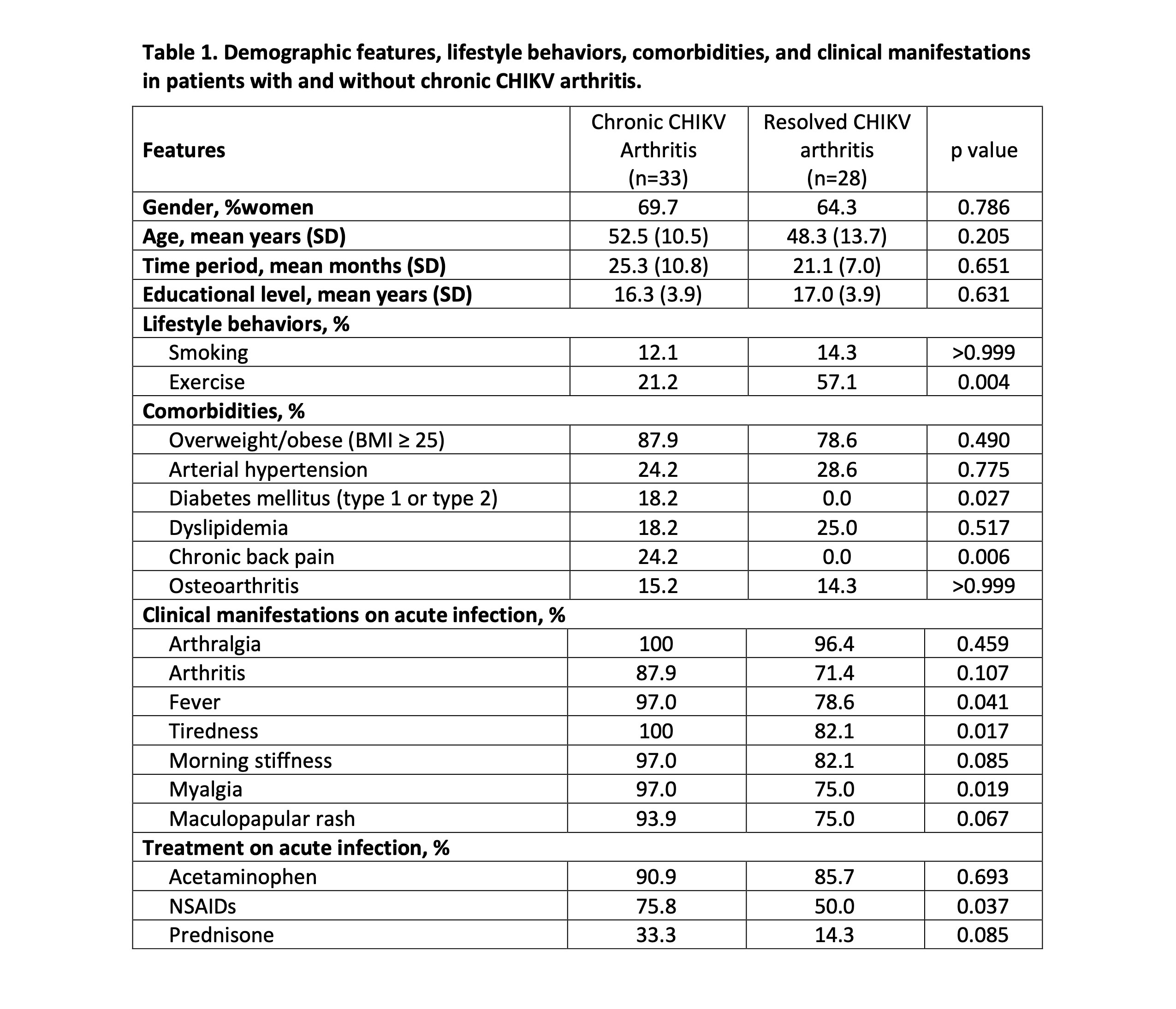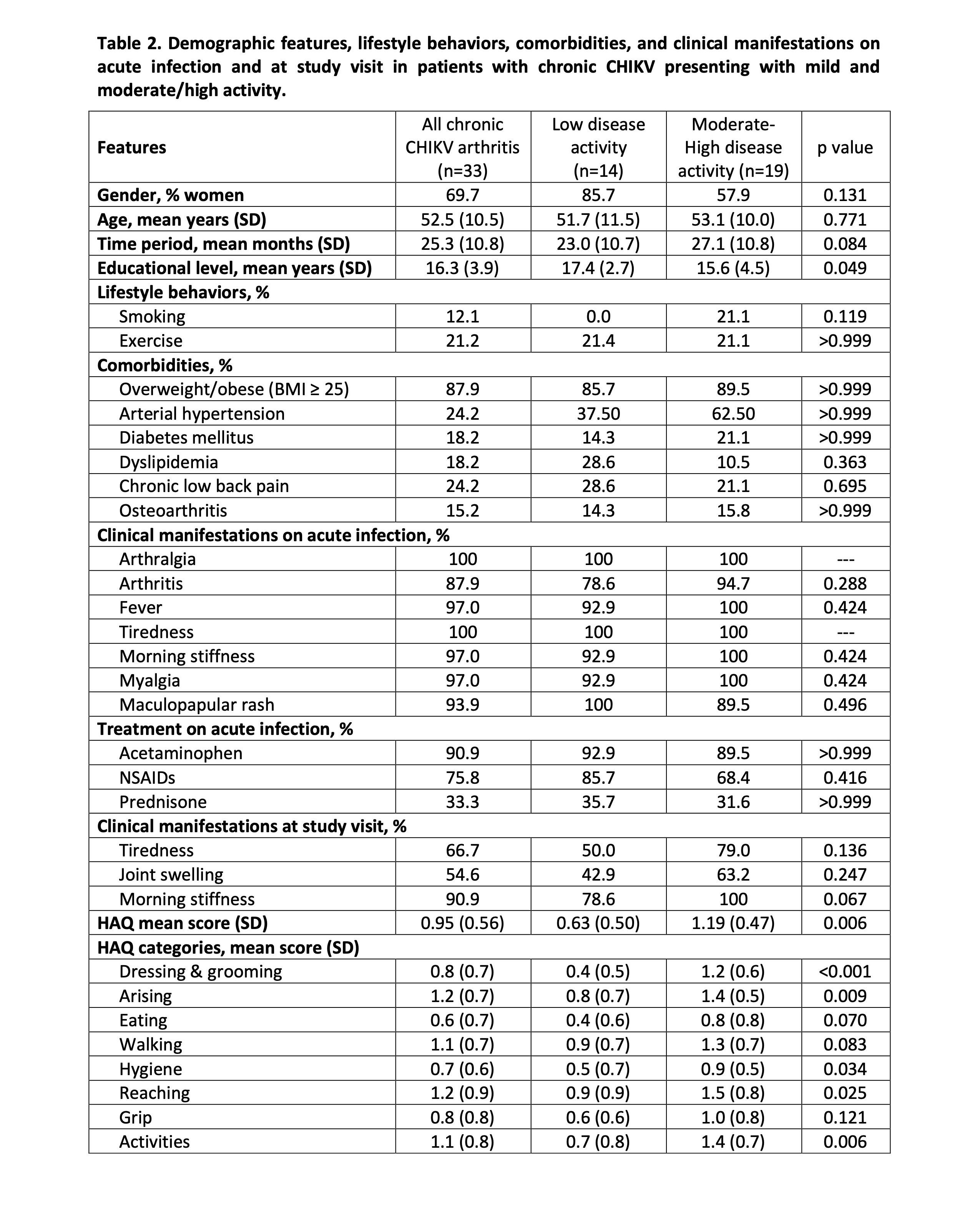Session Information
Session Type: Poster Session B
Session Time: 9:00AM-11:00AM
Background/Purpose: Chikungunya virus (CHIKV) is characterized by fever, maculopapular rash, and severe polyarthralgia and polyarthritis. Up to 80% of affected individuals may develop chronic CHIKV arthralgias and arthritis. Most studies on chronic CHIKV arthritis include patients treated with disease-modifying anti-rheumatic drugs (DMARDs), most likely altering the expression of clinical manifestations during the chronic phase. Therefore, we sought to evaluate the clinical features and correlates in patients with chronic CHIKV arthritis who did not receive therapy with DMARDs.
Methods: We conducted a cross-sectional study in adult (≥21 years) patients with serologically-confirmed CHIKV infection in Puerto Rico. All patients had inflammatory polyarthritis in the acute phase of infection. None received treatment with corticosteroids one year before study visit and, none receive DMARDs at any time. Demographic features, lifestyle behaviors, clinical manifestations, comorbidities, disease activity (per Clinical Disease Activity Index [CDAI]), functional status (per Health Assessment Questionnaire [HAQ]), and pharmacologic treatment were ascertained. Patients with and without chronic CHIKV arthritis were compared. Furthermore, a sub-analysis was performed among patients with chronic CHIKV who presented with low disease activity (CDAI < 10) versus moderate-high disease activity (CDAI ≥ 10) at study visit. Statistical analyses were performed using Fisher’s exact test, Pearson Chi-squared test, and Wilcoxon rank-sum test, as appropriate.
Results: In total, 61 patients were studied; 41 (67.2%) were women and the mean (standard deviation [SD]) period between onset of CHIKV infection and study visit was 23.4 (9.4) months. Thirty-three patients had chronic arthritis and 28 had resolved arthritis. Patients with chronic arthritis were more likely to have diabetes mellitus, chronic back pain, other symptoms on the acute phase (fever, tiredness, and myalgia), and to receive treatment with NSAIDs on the acute phase (Table 1). Among patients with chronic CHIKV arthritis, joint tenderness was most common in MCP joints (54.6%), shoulders (51.5%), PIP joints (45.5%), and knees (39.4%) at study visit. Swelling was observed in PIP joints (15.2%), MCP joints (12.1%), shoulders (9.1%), wrists (6.1%), ankles (6.1%), and MTP joints (3.0%). The mean (SD) HAQ score was 0.95 (0.56) and 57.6% had moderate-high disease activity per CDAI. Patients with moderate-high disease activity were more likely to have higher scores in overall HAQ and HAQ categories (dressing & grooming, arising, hygiene, reaching, and activities) when compared to those with mild activity (Table2).
Conclusion: In this group of DMARD-naïve patients with chronic CHIKV arthritis, nearly 58% had moderate to severe disease activity. Those patients had major functional disability, including significant dysfunction in several HAQ categories. Diabetes mellitus, chronic low back pain, and some manifestations on acute infection (fever, tiredness, and myalgias) were associated with chronic CHIKV arthritis.
To cite this abstract in AMA style:
Medina-Cintrón N, Martínez I, Pérez-Ríos N, Berríos-López Y, Vilá L. Clinical Manifestations and Outcomes in DMARD-Naïve Patients with Chronic Chikungunya Arthritis [abstract]. Arthritis Rheumatol. 2020; 72 (suppl 10). https://acrabstracts.org/abstract/clinical-manifestations-and-outcomes-in-dmard-naive-patients-with-chronic-chikungunya-arthritis/. Accessed .« Back to ACR Convergence 2020
ACR Meeting Abstracts - https://acrabstracts.org/abstract/clinical-manifestations-and-outcomes-in-dmard-naive-patients-with-chronic-chikungunya-arthritis/


